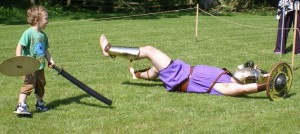I was talking to one of my students lately about her occasional frustration with training. The more she described her frustration, the more I realized that the problem was with her goals.
What Is A “Bad” Day Training?
For my student, bad days were described, in part, as “being helplessly stuck on the bottom for every sparring session, and going home feeling hopeless.”
This is common for many students, especially smaller ones (a category I tend to fall into, in your average class). Having been in bottom of side control a lot myself, especially with a knee injury over the last year, I’ve had to swallow a good amount of pride and face this question myself:
Is the success of a training session commensurate with the dominance I display while training?
The answer really depends on your goals. Thank goodness it does, too, because while you do not have control at all times over all opponents, you actually have complete control over your goals.
Defining “Good”
This is worth thinking about, no matter your level:
What are your goals, that, if achieved in a training session, will leave you feeling that you’ve succeeded, and had a “good” session?
If your definition of a “good” session is defeating or dominating all of your sparring partners, you’ll have ups and downs in your day-to-day training so out of control that you’re likely to become very frustrated. We just don’t have that kind of control over our opponents at all times to win at all times, no matter our level.
The most productive definition you can have of a “good” day is one in which you gave yourself every opportunity to improve in jiu jitsu. Do this by focusing on what you’d like to improve, and by setting goals that you have complete control over.
Along your path, there will be feedback and indications of your progress (catching someone you’re competitive with), but remember that those are fuzzy indicators (was it just an “off” day for your opponent?), and we shouldn’t make the feedback the goal in and of itself.
The real glory should be rewarding yourself for making a plan and sticking to it.
Goal Setting Suggestions
If you examine your own game, and you decide that you need more of something, set a goal related to the effort you put in, not the result you get. Some examples:
• Intimidated to spar: Roll with a certain number of people in your next session
• Unnecessary use of strength in your game: Tap a certain number of times in your next session
• Working on armbar escapes: Put yourself in armbar danger a certain number of times
• Working on escaping an inferior position: Try a certain escape until you figure out 2 or 3 reasons that your escape gets shut down. You now have a good question for your instructor or at the next seminar.
• Working on a particular armbar: Pick a trigger and vow to swing for an armbar every time that trigger occurs, whether you think you’ll hit the armbar or not in that moment
When you finish your next session, it’s a simple thing to do to ask yourself honestly if you hit these goals, which are completely attainable, and controlled by you.
Imagine The Ride Home
Remember, the person you want to impress most is the you on the way home that night (when you’re back to thinking about what you should’ve been working on). You’ll be so happy to find yourself saying:
• “I said I’d roll with 3 people, and I made sure I made it happen.”
• “I promised myself I’d tap out tonight, and I tapped 5 times instead of spazzing out of things.”
• “My armbar escape still needs work. I intentionally allowed myself to be put in armbar danger 10 times tonight. I tapped to every one, but I’m proud to be doing the hard thing to get better.”
• “I finally paid attention to why my elbow escape isn’t working tonight, rather than just focusing on forcing it to work. It’s the opponent’s weight on my far shoulder that pins me! I just need to run this question by my instructor next class, and then I’ll finally start getting somewhere…”
• “I hit like 1 of them, but I swung for every freaking armbar that came up tonight. If I keep doing this, I’m sure to tighten these up and have a solid attack!”
Results Notwithstanding
Even with “bad results” (few escapes, few armbars actually hitting), you can be proud of yourself that you’re doing the work you need to for the benefit of your game.
That’s what you go to class for, right?
Few people are doing what we’re talking about right now. Don’t be surprised when your dedication to game-improving goals, rather than day-to-day victories, results in a surprisingly faster payoff for you!
It’s in your control.



